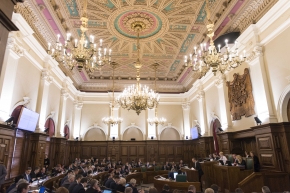 Galerie
Galerie
On Wednesday, 17 December, the Saeima adopted in the final reading the Law on the State Budget for 2015, the Law on Medium-Term Budget Framework for 2015-2017, one new budget-related law, as well as amendments to 18 other budget-related laws.
The state budget was adopted with 60 votes for, 13 votes against and 21 MPs abstaining.
Among the priorities of the state budget for 2015 is strengthening of national defence capabilities, as well as improving social and national security by implementing measures aimed at reducing the income gap and stimulating business competitiveness.
The state budget for 2015 preserves the existing tax policy and does not envisage an increase in current tax rates. Budget revenues are expected to increase as a result of a more efficient fight against shadow economy and improved tax administration.
The income gap will be reduced by increasing the minimum monthly salary from EUR 320 to EUR 360; in 2015 this will require an allocation of EUR 7.9 million from the state budget.
As of next year, all ceilings that were set in 2009 for social benefits - namely, sickness benefits, unemployment benefits, as well as maternity, paternity and parental benefits - will be lifted.
It was decided earlier that the personal income tax rate will be decreased from 24% to 23% as of 1 January 2015.
The state budget provisions also envisage tax relief to guardians of individuals under 19 years of age who are studying in general, vocational, higher or special educational institutions and who receive taxable income during the summer breaks.
As of next year, family benefits will be differentiated on the basis of the number of children raised by the family; that is, families with one child will be granted a benefit in the amount of EUR 11.38, the benefit for the second child will amount to EUR 22.76, and for the third and every successive child the benefit will be EUR 34.14.
From now on, support will be provided to a larger number of children with coeliac disease. Support will be also granted to disabled children up to 19 years of age who are studying in general or vocational educational institutions or to disabled children up to 24 years of age who are studying full time in higher educational institutions.
Furthermore, funding will be provided for rehabilitation of adult victims and perpetrators of violence. Social support will also be increased for people who were involved in eliminating the consequences of the Chernobyl NPP accident and for families of people who have died as a result of that catastrophe.
In the health-care sector, additional resources will be channelled for reducing waiting lines for out-patient services; increasing the availability of in-patient services, including scheduled treatments; improving provision of state-funded medicines, medical supplies and treatment of rare diseases; as well as developing and maintaining the e-health system.
In the state budget for the next year, EUR 3 million are earmarked for introducing a new remuneration model for teachers at state, municipal and private educational institutions. Expenditures for education, including provision of free-of-charge lunches also to fourth-grade students and improvement of the salary scheme for teachers, will be covered by budget revenue from the increased excise tax on alcoholic beverages.
In order to improve the social security coverage of micro-enterprise tax payers, as of next year the tax will be distributed among several budget sections, with the majority being channelled to social contributions.
A range of measures to fight the shadow economy are planned in order to increase tax revenue: improving information exchange among financial institutions, strengthening the capacity of tax administration, making council members of capital companies liable for late tax payments, prohibiting cash transactions for entities that have not settled their tax liabilities, introducing informative declarations for those offering leasing and loan services, as well as distinguishing between normal and commercial activities of non-profit societies.
Next year additional funding will be allocated for several other initiatives, such as organisation of joint camps in Latvia for children from diaspora families and local Latvian families, higher scholarships for vocational school students, planning the programme for the celebration of the state’s centenary, as well as continuation of the exhibition Corner House. Case File No. 1914/2014.
Additional funding will be allocated for several initiatives in the sphere of defence; they include ensuring the presence of rapid response teams and allies, developing the National Guard, establishing rapid response force units, developing special task force capabilities and developing a civic education system for youths. With this increase in funding, the defence budget next year will amount to 0.9% of GDP.
Resources are also earmarked for introducing public supervision of the construction sector, strengthening the internal security capacity of the Security Police, ensuring the functions of the State Police’s liaison officers stationed at the Europol offices in Ireland, the United Kingdom and Russia, and participation of civilian experts in international civilian missions and operations.
When considering amendments proposed by MPs, the Saeima decided to support the work of several non-governmental organisations and societies, schools, cultural institutions, music schools, sports centres, theatres, municipal projects, as well as maintenance of churches, social rehabilitation services and other measures.
The revenues of the consolidated state budget for 2015 are estimated to be in the amount of EUR 7.25 billion, while the budget deficit is set at 1% of GDP. In comparison with the budget for 2014, expenditures have increased by EUR 283 million because of decisions made and initiatives launched last year. Revenues are expected to increase by EUR 208 million.
The Law on the State Budget for 2015, the Law on Medium-Term Budget Framework for 2015, 2016 and 2017, as well as other budget-related laws, will come into force on 1 January 2015.
Saeima Press Service







